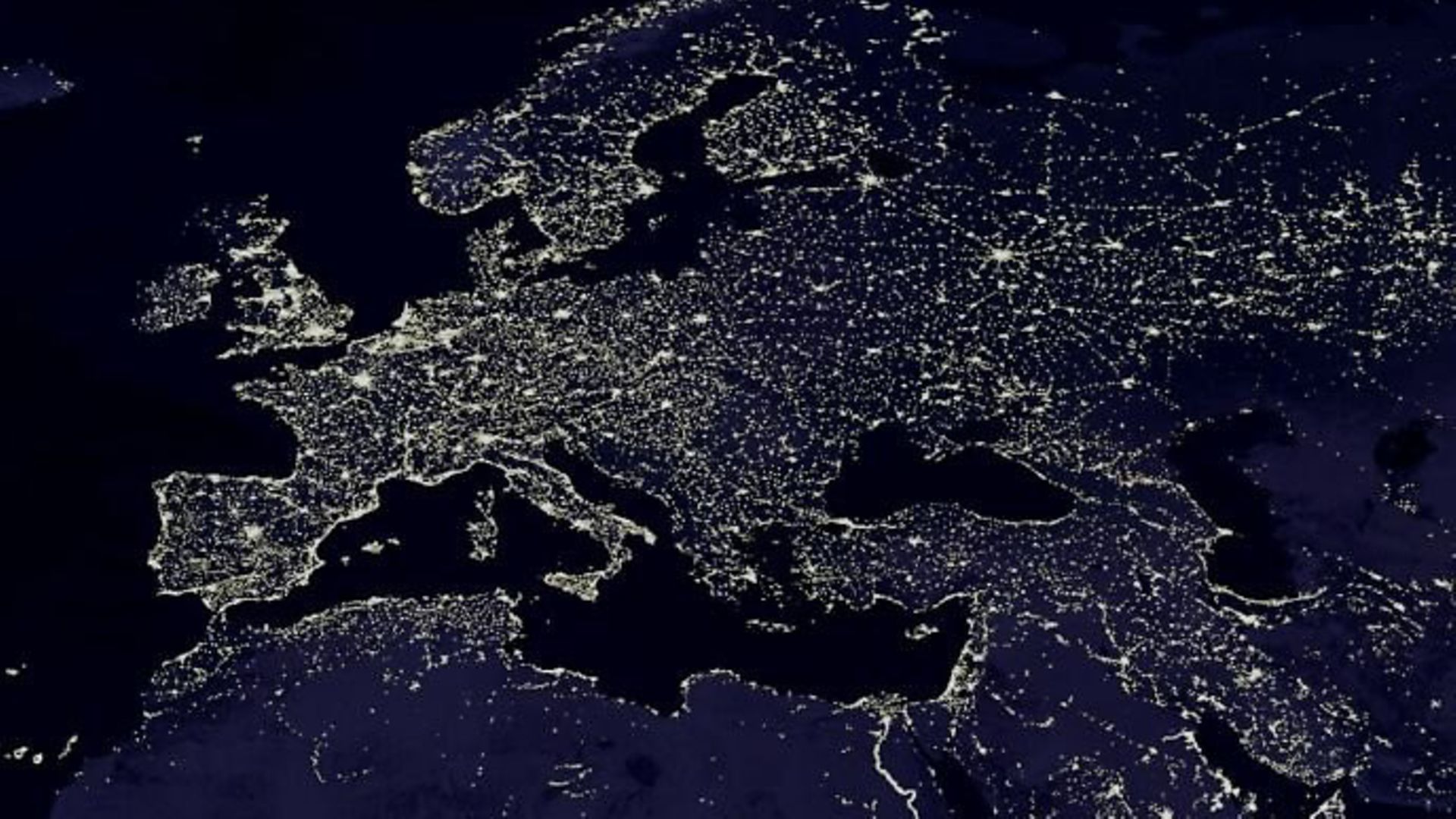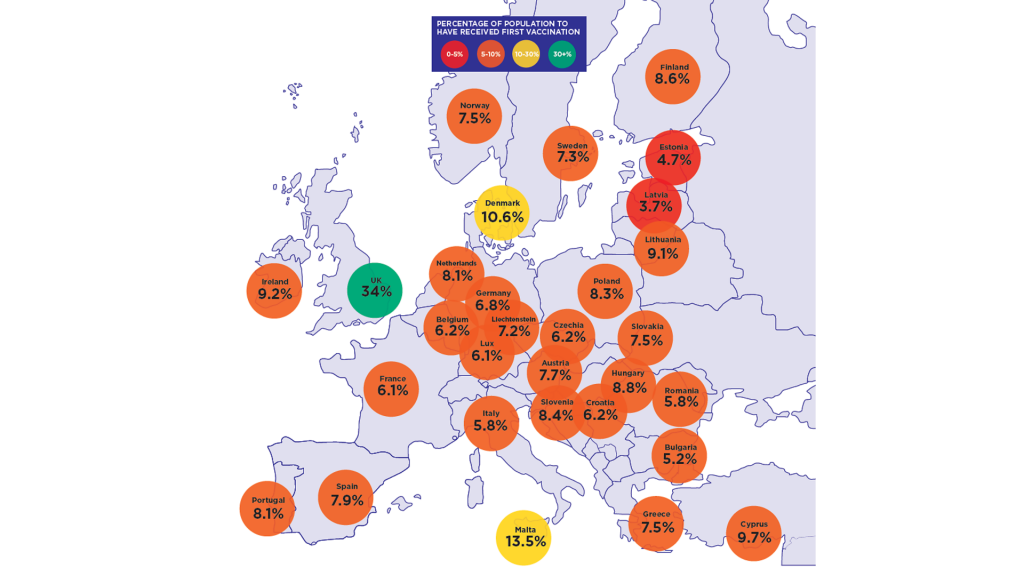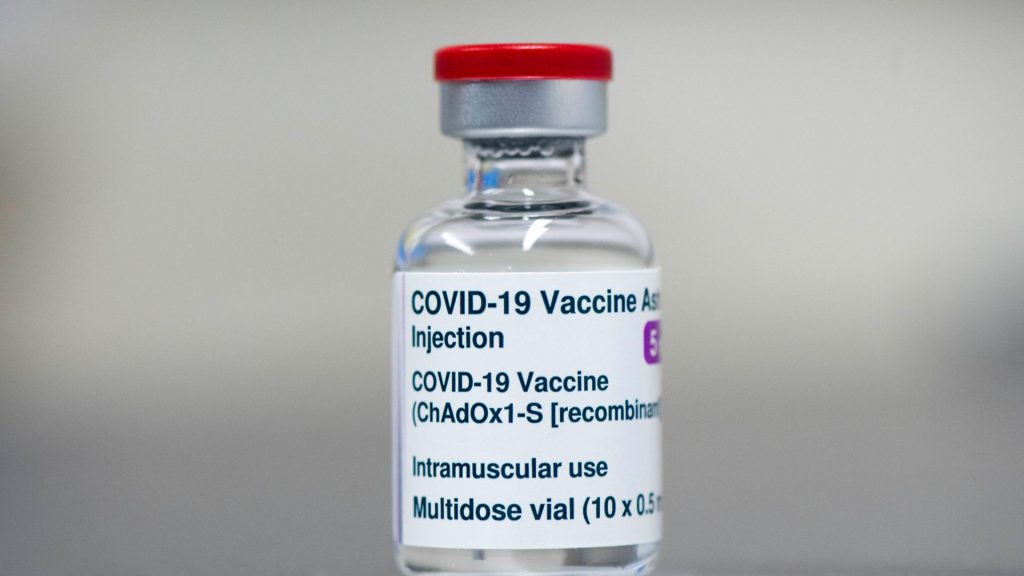
JAMES BALL on Europe’s very uneven vaccine rollout.
With so much riding on the vaccine rollout across Europe, it is perhaps unsurprising it has been quite so tempestuous and bad-tempered. Governments have been accusing one another of irresponsibility, of cheating on supplies, or botching their rollouts. Last week, Italy even stopped a shipment of vaccines destined for Australia arguing the supplier had failed to meet its obligations to the bloc – and the EU refused to intervene to stop it doing so.
The intervention was unlikely to be critical for Australia (which sources most of its supply from outside the EU) but was a symbol of how an issue that should rely on international solidarity – the world is not safe until every country is vaccinated – is descending into national squabbles.
That fractiousness has extended to commentators in the traditional media and on social media too: noting differences between countries’ performance can easily descend into an argument about first and second doses, rollout strategies, national circumstances and more.
What should be beyond dispute – though isn’t – is that the UK is by far the best performer on vaccination in Europe, and is doing far, far better than any EU nation. The people finding reason to hope or reason to celebrate the UK’s vaccine rollout are right to do so: however you cut it, it’s performing excellently.
On March 7, the UK hit another vaccination landmark, having given a first jab to more than one in three of its population – more than 22 million first shots. That is a first jab rate almost three times higher than any EU nation, and almost nine times higher than some.
The UK’s vaccine strategy – which is increasingly backed by scientific evidence – delays second jabs for around 12 weeks, meaning it has done far fewer second jabs. But at 1.6% of the population with second jabs, even here it would not be the lowest in the EU.
Suspicions the UK government was prioritising first jabs to flatter its figures or manage meagre supplies also appear to be unfounded: the base statistics say a lot. The UK has so far administered 23 million doses of vaccine to a population of 67 million people. EU nations have, in total, administered 38 million doses to a population of 448 million.
But those totals mask very different situations in different countries. Among different European states, the picture is very uneven: some have very low stocks of vaccine, some have large stockpiles they haven’t administered. Some are struggling to win over public confidence, others are having relatively smooth rollouts, if slower than the UK’s.
Here, we cast a spotlight on a selection of European countries and their vaccine rollout progress.

France
Doses distributed: 7,931,155
Doses administered: 5,016,763
France’s vaccine rollout is accelerating, but from an extremely slow start which saw it giving mere hundreds of vaccines a day as other countries did hundreds of thousands. The country is battling a much higher baseline level of vaccine hesitancy than the UK, though its ministers have compounded this with sometimes recklessly negative comments about the AstraZeneca vaccine – which they then approved last week for use in their over-65s.
Overall, just 6.1% of France’s population has had their first dose of one of the coronavirus vaccines. The country also appears to be having issues administering the AstraZeneca jab in particular – while more than 75% of the Pfizer jabs distributed to France have been given to patients, for the AZ jab this figure falls to just 23%.
Germany
Doses distributed: 10,377,045
Doses administered: 7,082,562
Germany is far from the worst performer for its vaccine rollout in the EU – though it’s in the bottom half of the table at 6.8% with at least one jab – but vaccine distribution is perhaps more contentious here than in any other European country.
In fact, distribution is such a scandal in Germany that papers there are starting to talk about it as a blot on the legacy of Angela Merkel, coming as it does in the very final months of her time as chancellor. A nation that prides itself on efficiency and competency is being very publicly outmatched on delivery of an absolutely essential service.
Some 51% of Germans think the EU has handled the vaccine rollout badly, and 46% believe the national government has mismanaged it, according to polling by Kekst CNC. Complaints in the country tend to revolve around bureaucracy – despite generally handling coronavirus well, booking vaccines has been complex, local doctors have been cut out of distribution, and supply has been slow.
Malta
Doses distributed: no data
Doses administered: 78,978
With a population of just 500,000 the island country of Malta is hardly a European superpower – but it does have by far the best distribution of first vaccine jabs, with around one in eight people having had their first shot. This is markedly behind the UK, but is around 50% ahead of the EU average.
Malta has shared similar reservations over AstraZeneca as other EU nations – it is administering AZ vaccines, but only to adults under the age of 55, and has only started in the last week or so. The country also appears to be more proactive than some larger nations in securing supply: it has advance orders of multiple vaccine candidates not yet approved by the EU (or UK) and so is more confident of future supply than many of its neighbours.
Italy
Doses distributed: 6,374,220
Doses administered: 4,306,527
Italy was the first European country to have a major coronavirus outbreak, and the lockdown of multiple northern Italian regions early last year marked the first time many of us realised the true scale of what was heading our way.
After that initial devastating peak, Italy has generally handled the pandemic quite well – but seems to have stalled when it comes to the vaccine rollout. Fewer than 6% of its population has had even a single vaccine jab, one of the worst rates in Europe, and it has not administered a sizeable share of the doses it does have.
Predictably, this problem is most severe for the AstraZeneca jab: just 21.3% of its 1.5 million doses of this vaccine have been administered. Against a backdrop of rising cases and deaths, the government has pledged a major acceleration of vaccine rollout, and took the political decision to block the export of vaccines to Australia. Italy is also further dealing with regional tensions: Lombardy, which has the highest level of cases in the country, is asking for priority treatment – so far to no avail.

Ireland
Doses distributed: 613,650
Doses administered: 492,081
Ireland is one of the EU’s best performing nations on vaccination, with almost one in ten of its population already having received their first jab – but its proximity to the UK naturally draws comparisons and so is compounding frustrations and political tensions.
The country has just expanded its vaccine rollout to cover working age adults with serious illnesses in the last week, and its political leadership are trying to encourage comparisons with other EU nations rather than just with the UK.
Despite its comparatively good progress, Ireland has been missing its internal vaccination targets, but its politicians are still speaking optimistically about meeting their overall target – to vaccinate the whole population by September.
Hungary
Doses distributed: 1,695,240
Doses administered: 949,985
Hungary’s chaotic populist government – helmed by would-be strongman Viktor Orban – is mired in an economic crisis, which seems to be hampering its vaccine rollout. While it has a relatively high (by EU) standards 8.8% of its population with at least one shot of a vaccine, it has administered among the lowest levels of the doses it has received.
Hungary has also departed quite markedly from the vaccination strategy of many EU countries, having obtained tens of thousands of doses (so far) of Russia’s Sputnik vaccine, and has made orders for China’s vaccine too.
Use of the Sputnik vaccine in particular is contentious in the EU, given Hungary has already administered thousands of doses despite it not yet being approved by the EU’s regulators. Orban, a longtime far-right populist, appears to be using the new vaccines as part of a political wedge strategy to further inflame EU tensions – ahead of an election next year. So far, Commission officials appear to be avoiding taking the bait, simply ignoring his provocations.
Greece
Doses distributed: 1,212,060
Doses administered: 1,023,509
Greece does not enjoy a reputation as one of the world’s best-governed nations, but generally seems to be doing reasonably well by EU standards when it comes to vaccination. Around 7.5% of its population is vaccinated, which is fairly mid-table, but it has administered a higher percentage of the vaccine doses it has received than any other EU nation – suggesting it is hitting fewer bureaucratic hurdles than others.
Given its economy’s reliance on tourism, Greece is both trying to get its vaccine programme completed by summer and is agitating the EU to accelerate vaccination across the bloc, too. The Greek government is also advocating strongly for vaccine passports to kickstarts its tourism, and has signed a deal on those with Israel already.
Latvia
Doses distributed: 101,040
Doses administered: 75,799
The small Baltic nation has the slowest vaccine rollout of any EU nation, with just 3.7% of its population having received one or more doses. Its near neighbours and fellow accession nations (relatively recent EU joiners) Bulgaria, Estonia and Romania have similarly low vaccination rates.
It is, perhaps, relatively unsurprising that the EU’s poorer nations are generally faring worse in the vaccine rollout, but Latvia at least is sticking with the mainstream EU strategy, rather than turning to Russia’s Sputnik vaccine as Hungary’s Orban is doing.
Unfortunately, its vaccine rollout has crawled to a halt and coronavirus cases are rising, with the government expected to introduce further restrictions in the next few weeks. Latvia’s government was among several last month urging the EU to accelerate approval procedures for the AZ vaccine and to prevent bureaucracy stalling the bloc’s vaccine rollout. “Precision of procedures matters,” the country’s prime minister Krisjanis Karins tweeted. “But so does speed. The delays cost lives.”
What do you think? Have your say on this and more by emailing letters@theneweuropean.co.uk










